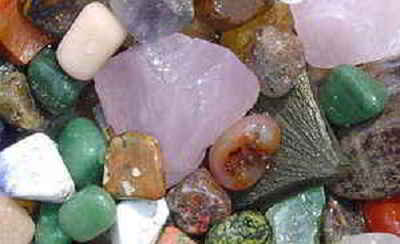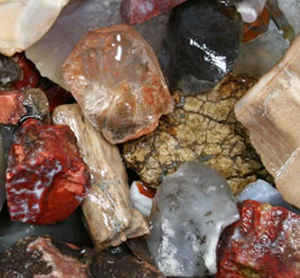Colorado State Rock
Yule Marble

(Marble)
Adopted on March 9, 2004.
In 2004, Girl Scout Troop 357 of Lakewood petitioned the Legislature to have the Yule Marble designated as the Colorado State Rock.
Governor Owens subsequently signed HB04-1023 into law on March 9, 2004. This white marble is comprised of almost pure calcite grains tightly joined
to give it a luminous quality. A marble deposit was reported in 1882 in Gunnison County on Yule Creek although a producing quarry did not begin operations
there until 1906. The outstanding quality of the Yule Marble made it the choice for use in the basement of the Colorado Capitol as well as numerous
national monuments in the United States including the Washington Monument, the Lincoln Memorial and the Tomb of the Unknown Soldier.
Colorado State Rock: Yule Marble

Yule Marble is a marble of metamorphosed limestone found only in the Yule Creek Valley, in the West Elk Mountains of Colorado, 2.8 miles (4.5 km) southeast of the town of Marble, Colorado. First discovered in 1873, it is quarried today inside a mountain at 9,300 feet (2,800 m) above sea level, in contrast to most marble, which is quarried from an open pit and at much lower elevations. George Yule (for whom the marble was later named) was the prospector who "rediscovered"the marble in 1874. In the same year, an unknown person took some marble - from which polished samples were made - and appeared in Denver but failed to generate interest. The marble became lost again, and was rediscovered 10 years later, yet again by accident.

It is the grain of Colorado Yule Marble that gives it an appearance of smooth texture, a homogeneous look, and a luminous surface that polishes well. These qualities are why it has been chosen for a number of major national and state landmarks, most notably the Lincoln Memorial.
The localized geology created a marble that is 99.5% pure calcite, with a grain structure that gives a smooth texture, a homogeneous look, and a luminous surface. It is these qualities for which it was selected to clad the exterior of the Lincoln Memorial and a variety of buildings throughout the country, in spite of being more expensive than other marbles. The size of the deposits enables large blocks to be quarried, which is why the marble for the Tomb of the Unknowns, with its 56-long-ton (57 t) die block, was quarried from Yule Marble.

Located along and above the east and west side of Yule Creek, from an elevation of 9,000 feet (2,700 m) to 9,500 feet (2,900 m), where five quarries, of which only one on the west side is in operation today. Those on the west, being the John Osgood quarry, (pit-type started in the early 1890s) and the present day quarry started in 1905 by the Colorado Yule Marble Company inside the mountain. The east side quarry, started in 1904 by the Strauss brothers, was quarried inside Whitehouse Mountain. Most marble quarries in the world today are pit-type operations, such as in Carrara, Italy.
Yule's quality comes at a high price due to the cost of quarrying in a high-altitude mountain environment. This challenge has caused the industry and the town of Marble to undergo many boom-and-bust periods since quarrying started in the mid-1880s, making the town emblematic of the economic fluctuations that beset a single-industry economy. Technology advancements in quarrying machinery and transportation have reduced, but not solved, the cost problem that afflicts the operation through the present.
Fact Sheet on Yule Marble from Girl Scout Troop 357
- Colorado is the Centennial State
- Colorado has a red Official State Mineral, rhodochrosite
- Colorado has a blue Official State Gemstone, aquamarine
- If the state rock were white, the Official Geological symbols would be red, white and blue.
- The Yule Marble is white.
- The Yule Marble has been used in many famous buildings and sculptures.
- The Lincoln Memorial in Washington DC.
- In the Washington Monument, each state contributed a 20" x 40" rock to line the inside of the monument, and Colorado chose the Yule Marble.
- The Tomb of the Unknowns, currently being renovated, is made of the largest
single block of marble produced in the United States. - Colorado State Capitol building.
- Cheesman Memorial, Denver.
- Colorado State Museum, Denver.
- Denver Court House.
- As the state known for the majestic Rocky Mountains, it seems odd that the state does not yet have an official state rock.
- Only 9 states have 3 geological symbols (rock, gem and mineral), and none of them have the color combination of red, white and blue.
- Only 4 states have a state rock that matches the rock in the Washington Monument for that state.
- The Yule Marble is a strong, beautiful rock.
- It is composed of 99.5% pure calcite
- The grain size yields brilliant cleavage sparkles in the unpolished stone.
- It has lasted almost 100 years in the humid environment of DC.
- The first major use of the Yule Marble was in the Colorado State Capitol building, in 1895.
Colorado Law
The law designating the Yule marble as the official Colorado state rock is found in the Colorado Revised Statutes Title 24, Part 9, Sections 24-80-912.7 reflecting changes current through all laws passed at the First Regular Session of the Seventieth General Assembly of the State of Colorado (2015)
TITLE 24. GOVERNMENT - STATE
STATE HISTORY, ARCHIVES, AND EMBLEMS
ARTICLE 80.STATE HISTORY, ARCHIVES, AND EMBLEMS
PART 9. STATE EMBLEMS AND SYMBOLS
C.R.S. 24-80-912.7 (2015)
24-80-912.7. State rock
Yule marble is hereby made and declared to be the state rock of the state of Colorado.
HISTORY: Source: L. 2004: Entire section added, p. 76, § 1, effective August 4.
Minerals, & Gems

Gemstone, Minerals, Rocks







